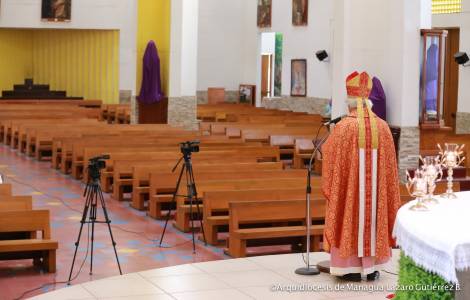
Managua (Agenzia Fides) - On January 28th, the Archbishop of Managua, Cardinal Leopoldo Brenes, announced that future meetings with the priests of the Archdiocese would take place on the digital platform Zoom until further notice. This decision was taken to prevent the spread of Covid-19 after the number of infections in the Central American country had increased in recent weeks. "From now on, the meetings of all clergymen will be held virtually," said Cardinal Brenes in a statement from the Archdiocese of Managua.
Meetings and discussions in smaller groups are to be held partly personally and partly virtually in the communities. They should "take place in presence, following the health protocol and keeping personal distances in the meeting rooms, or virtually according to the available resources of each parish or pastoral area", he explained.
The Cardinal confirmed the "prohibition of processions and gatherings" and "appropriate times, a short liturgy and the laying of ashes on the head" are desired for the forthcoming Ash Wednesday rite. He regrets, said the Cardinal, that many believers will not be able to take part in the church rite.
With regard to the sacraments of Confirmation and First Communion, parish priests should find the best way to celebrate them in accordance with applicable health protocols.
From the beginning, the Catholic Church in Nicaragua strictly adhered to the guidelines of the World Health Organization (WHO) to prevent the spread of Covid-19, and ordered the closure of churches and the ban on processions as well as compliance with the applicable health measures in all parishes.
Since the beginning of the pandemic, church services have been broadcast by traditional media and social networks.
In contrast, the Nicaraguan government did not impose any restrictions in view of the pandemic and limited itself to a minimum of preventive measures. During the second wave of the pandemic, the number of infections in the Central American country rose sharply. (CE) (Agenzia Fides, 30/1/2021)